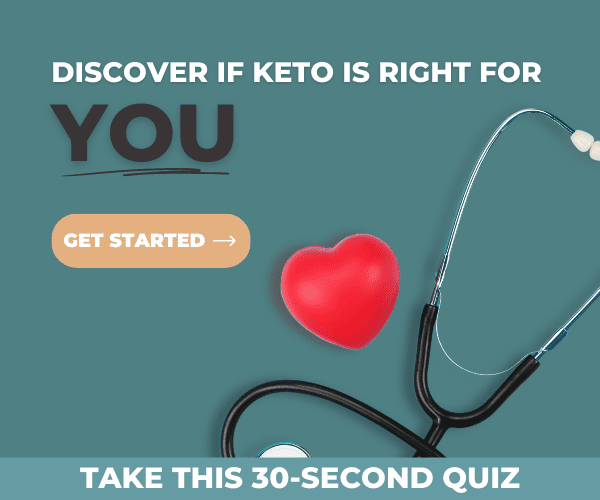
You know chowing down on an entire pizza or a bowl of pasta will push you out of ketosis if it isn’t a low-carb keto-friendly version with almond flour or konjac noodles, but what about vitamins? Today, people everywhere take supplements and vitamins to enhance health and wellness and restore deficiencies. If you’re on a ketogenic diet, you might be wondering if vitamins can also affect ketosis.
Why Take Vitamins?
Some of the most popular supplements to take on a ketogenic diet are vitamin D3, digestive enzymes, and magnesium. Taking vitamins and, in particular, electrolyte supplements can improve symptoms of keto flu that you might experience upon first starting the keto diet.
Multivitamins are a good way to ensure you’re still getting important nutrients as you switch to a keto diet and learn how to choose and use low-carb fruits and vegetables. Studies also show multivitamins can lower body fat and protect from illnesses like heart disease and certain types of cancer. [1] [2]
Do Vitamins Affect Ketosis?

Ketosis is a metabolic state achieved by reducing your carbohydrate consumption below a specific amount, typically less than 50 grams of net carbs daily. Minerals and vitamins are pure compounds that shouldn’t affect ketosis; however, lots of available supplements also have added fillers. The fillers are where there could be a problem. Fillers like maltodextrin, dextrose, and dextrin are carb-based.
While these simple added sugars and carbs aren’t ideal for keto, even if your vitamin has fillers, it’s unlikely there’s enough filler to affect ketosis unless you’re consuming larger amounts.
In general, then, you don’t have to be concerned with supplements containing too many net carbs and interfering with ketosis. The minor amount of carbs you obtain through a vitamin supplement won’t be enough to impact your blood sugar to the point where you switch out of ketosis.
It’s a little easier to overeat tasty multivitamin gummies with added sugar than it is to overeat powdery tasting supplements or gelatin capsules. While you’d have to eat a lot of multivitamin gummies for those alone to take you out of ketosis, if you’re on the keto diet it’s best to stick to vitamins in capsule form and save your carbs for fruits and vegetables.
Finding the Best Vitamins for Keto
Many supplements are specifically designed to be keto-friendly or cleaner with fewer additives and ingredients and no carbs or sugar. Healthier supplements that are a better choice usually have labels like:
- Non-GMO
- Non-irradiated
- Gluten-free
- Free from allergens
- No synthetic additives
- No artificial colors or preservatives

Most vitamins you purchase in a pill form should be safe for ketosis, but you should still be mindful and double-check the ingredients and fillers. Closely look at vitamin drinks, gummies, and multivitamins, which might have more sugars than other supplements containing only one or two nutrients.
Remember, it isn’t just about the carbs but also the quality. Some supplement companies use genetically modified and highly processed ingredients or ineffective forms of nutrients, such as forms of magnesium and vitamin C that aren’t readily absorbed.
Supplementing the Keto Diet
Vitamins and supplements should be an addition to support your well-formulated, balanced ketogenic diet. They shouldn’t make up for a poor diet lacking in nutrients; rather, they should optimize a proper diet. Supplementation can provide you with necessary and beneficial nutrients.
Before buying a vitamin, be sure to read the label, check the ingredients, and make sure you’re sourcing quality supplements from a reputable company that’s been tested by a third party, such as NSF International. Some supplement companies use ineffective forms of nutrients, such as genetically modified and highly processed ingredients.
It’s best to discuss supplements with your healthcare provider. Some mineral or vitamin supplements (particularly fat-soluble vitamins that are stored by the body) can be toxic when taken in excess, so be mindful that you’re taking appropriate doses.
Do you take vitamins and supplements on keto? Share your favorite supplements and tips with the keto community!
References
Rautiainen, S., Manson, J. E., Lichtenstein, A. H., & Sesso, H. D (2016). Dietary supplements and disease prevention: A global overview. Nature reviews. Endocrinology, 12(7), 407–420. https://doi.org/10.1038/nrendo.2016.54
Li, Y., Wang, C., Zhu, K., Feng, R. N., & Sun, C. H. (2010). Effects of multivitamin and mineral supplementation on adiposity, energy expenditure, and lipid profiles in obese Chinese women. International Journal of Obesity (Lond), 34(6), 1070-7. DOI: 10.1038/ijo.2010.14









